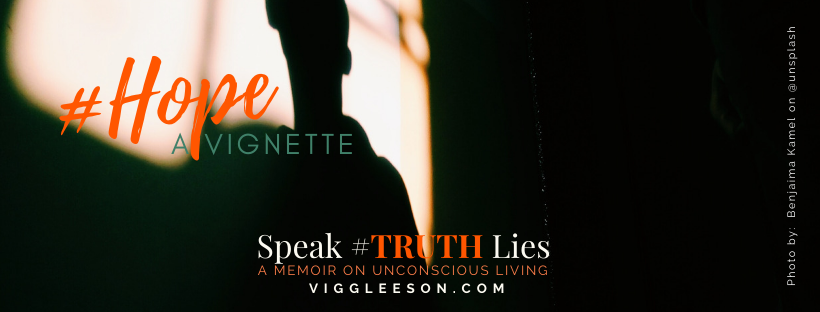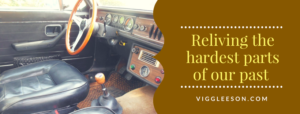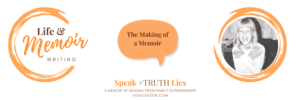It’s re-write time and from the muddy pool of shitty drafts, a small jewel appears – at least I think it’s a jewel. I rinse it, I dry it and polished it down to the bone.
What’s left is a mere smidgen of a vignette, but it gives me hope. – A different kind of hope from what I had back then, – I hope. . .
He woke me in the middle of the night. “You have to help me now Vigdis,” I remember his stuttered whisper. His silhouette looked pitiful in the arched opening he’d cut – between my two basement rooms – years earlier. His figure crooked and unstable against the light falling in behind him.
I flicked on my bedside lamp and jumped out of bed. Yes Sir, I nearly saluted, ready to report for service, Sir. I didn’t say that, of course. Grabbing the first piece of clothing slung over the back of my desk-chair, I asked “what’s up?” as I pulled on my jeans. His mutters didn’t make much sense so I read form the clues while I sat down to tug on my socks. The inability to put sounds together to resemble words. The shaking, the narrow bloodshot eyes and puffy face. The swaying, the swollen red hands. Pulling my jumper over the t-shirt I’d been sleeping in I noticed his breathing, fast and shallow, pushing the air out in short burst, scared, he seemed, of his own breath, as if a proper out-breath would break him, maybe it would have.
“We best get you to a doctor then.”
I took him by the arm, turned him around and without a backwards glance lead him out the door, across the concert floor, then guiding him in front of me, walking close behind him up the wooden basement stairs.
In the dim light of our entrance hall, I left him swaying beside me as I squeezed into my trainers without unlacing them first. He could go in his slippers – I wasn’t going to attempt to help him change. I grabbed the car keys from the tin bowl on the low commode, avoiding my reflection in the matching mirror above.
In the car, he didn’t say a word in all fifteen minutes to the hospital, just a few grunts, I couldn’t tell if they were from pain – I was afraid he would get sick – or a reaction to something I said. I said very little. “How has it come to this?” and “What is so wrong you feel drinking is the only cure?”
The young doctor didn’t say much either. I’m sure he’d seen too many cases of delirium tremens to last him a lifetime already.
“Is he being violent?” He asked me.
“No, not violent, just very difficult,” my voice deflated.
“I see.” He was giving The Captain, seated on a gurney, a quick once over.
“How are you doing Rasmussen?” He asked. Dad didn’t answer. The doctor walked off. I stayed in the cubicle with him till the doctor came back and released him into my ‘care’ equipped with a prescription and a few pills – in a paper bag – enough to send The Captain into oblivious sleep.
“Don’t take these until you’re home, and tomorrow make an appointment to see your physician.” The young doctor scrawled what I assume was his signature on the green sheet of paper fastened to a silver clipboard and with that, he swiftly pulled back the striped curtain and was gone before the rattle of the hooks sliding across the silver rail above our heads ebbed away.
Back in the car, I set the paper bag of pills between our front seats, The Captain quickly grabbed it, holding it tight in both swollen red hands on his lap, all the way home, not a word. Only his breathing had changed. Longer out-breaths now, further apart, like the sighs form someone enduring lashings of pain. Oh please don’t get sick in the car, I prayed.
I backed into our drive, he slammed the door. Before I’d pulled the keys out after locking the car Dad was through the front door – I’d left unlocked. By the time I reached the hall, he’d disappeared to his room, closing his door, not a word.
At the time I judged him harshly for getting himself into such a pitiful state, and still, I had faith. He was right about one thing – no matter how much I disagreed – at twenty-four I didn’t know much about the world. Still innocent and naive I thought that if we rallied around him, as a family, and with some professional help, he would recover and from it, we would learn to talk and all grow stronger. I didn’t understand what had turned him into such a drunk but I wanted to know and more than that I wanted to help. I wanted to fix our family and make it great.
It was the closest I ever felt to him. It is the most vulnerable I’ve ever seen him, I was sure this was his rock bottom and from here he could only rise. It was with this hope I finally fell back asleep. A sense of excitement for the morning that would surely bring a bright new day when everything would turn around and be ok again.
“What hurts so bad about youth isn’t the actual butt whippings the world delivers. It’s the stupid hopes playacting like certainties.”
― Mary Karr, Lit
Much Love and Light
Vig ❤️
Tow of my favourite memoirs on drinking and alcoholism is ‘Lit’ by Mary Karr and ‘Drinking: A Love Story’ by Caroline Knapp
“For a long time, when it’s working, the drink feels like a path to a kind of self-enlightenment, something that turns us into the person we wish to be, or the person we think we are. In some ways the dynamic is simple: alcohol makes everything better, until it makes everything worse.”
― Caroline Knapp, Drinking: A Love Story



